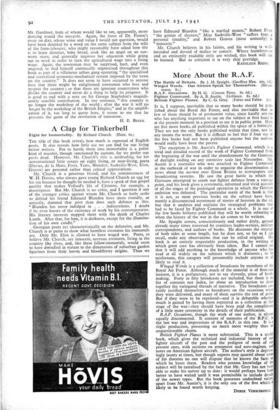More About the R.A.F.
IT is, I suppose, inevitable that so many books should be pub- lished about the Royal Air Force; and also inevitable that so few of them should be of permanent value, since hardly anyone who has anything important to say on the subject at first hand is at the present moment in a position to say it in public print. Here are five more books, all published within the space of a fortnight. They are not the only books published within that time, nor by any means the worst. But it is difficult to feel that if four out of the five books had not been published anyone but the authors would really have been the poorer.
The exception is Mr. Austin's Fighter Command, which is a vivid and detailed record of the work of Fighter Command from the beginning of the war until the abandonment by the Germans of daylight raiding on any extensive scale last November. Mr. Austin is a journalist who was attached to Fighter Command at the outbreak of war in order to organise the dissemination of news about the air-war over Great Britain to newspapers and broadcasting systems. He saw the great battle in which the Germans attempted to crush our fighter defence from a vantage point, and his book gives a systematic, informed and vivid account of all the stages of the prolonged operation in which the German ambition was defeated. The particular merit of the book is that it is not, as most previous books on the subject have been, merely a disconnected assortment of stories of heroism in the air, but that it analyses and explains the strategical problems that had to be faced by Fighter Command as a whole. It is one of the few books hitherto published that will be worth referring to when the history of the war in the air comes to be written.
Mr. Spaight covers, conscientiously and rather dryly, ground already many times traversed by countless leader-writers, military correspondents, and authors of books. He discusses the strategy of both sides at some length, but he does not, so far as I can recall, make any observations that can be called original. His book is an entirely respectable production, in the writing of which great care has obviously been taken. But I cannot see that it will add anything to the knowledge of anyone who has read at all widely on the subjects which it discusses ; to its misfortune, this category will presumably include anyone at all likely to read it.
Winged Words is a collection of broadcasts by members of the Royal Air Force. Although much of the material is of first-rate interest, it is a perfunctory, not to say slovenly, piece of book- making. Forty or fifty broadcasts are included, but there is no list of contents nor index, let alone an introduction to draw together the variegated threads of narrative. The broadcasts cer- tainly justified themselves as broadcasts on the occasions when they were delivered, and many of them survive the test of print But if they were to be reprinted—and it is debatable whether much is gained by having them reprinted as a collection at this stage of the war—they should have been paid the compliment of a little more ceremony in the details of their publication. R.A.F. Occasions, though the work of one author, is almsc equally disconnected. It consists of memoirs of the R.F.C. in the last war and impressions of the R.A.F. in this one. It is a slight production, possessing no merit more weighty than an unquestionable charm. British Fighter Planes is more substantial. This is a useful book, which gives the technical and industrial history of a fighter aircraft of the past and the pedigree of most of out present ones, with sections on armament and aero-engines, an4 notes on American fighter aircraft. The author's style is depress- ingly jaunty at times, but though experts may quarrel about some of his theories no one will dispute that he knows the facts on which he bases them. Readers who possess knowledge of subject will be tantalised by the fact that Mr. Grey has not be0 able to make his survey up to date : it would perhaps have beep better to have waited until it was permissible to include detail of the newer types. But the book possesses undoubted value; apart from Mr. Austin's it is the only one of the five which likely to be found word' keeping.
DEREK VERSCHOYLE.


























 Previous page
Previous page